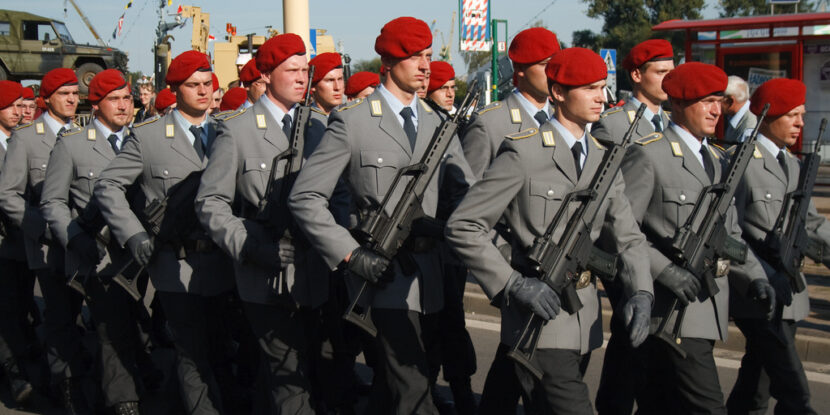
PULSE POINTS:
❓ What Happened: Gregory Maniatis, director at George Soros’s Open Society Foundations, admitted that progressive politicians’ failure to manage migration and progressive foundations’ lawfare to protect illegal aliens has sown chaos.
👥 Who’s Involved: Gregory Maniatis, Open Society Foundations, progressive non-governmental organizations (NGOs), and the Trump administration.
Your free, daily feed from The National Pulse.
📍 Where & When: United States, with Maniatis’s remarks made at a Carnegie Council event in April.
💬 Key Quote: “Chaos is the defining story of failure amongst progressives,” Maniatis confessed.
⚠️ Impact: Maniatis’s admission exposes how progressive elites’ legal tactics and refusal to enforce order paved the way for America First.
IN FULL:
Gregory Maniatis, a director at George Soros’s far-left Open Society Foundations, has admitted that progressive immigration policies plunged America’s border into chaos. Speaking candidly at a Carnegie Council event in April, Maniatis admitted that 12 years of Democrat control over the past 16 years failed to deliver a functional immigration system, instead fostering anarchic conditions that President Donald J. Trump has capitalized on to restore order.
“Chaos is the defining story of failure amongst progressives,” Maniatis said, pinpointing the refusal of Democratic leaders to address a “chaotic” border system, particularly over the last decade. He criticized the “conspiracy of silence” that allowed employers to exploit illegal alien workers while progressive politicians used a broken illegal immigration system to let illegal aliens “disappear” into communities rather than persuade the public to accept mass migration or manage it effectively. “Not everyone has the right to stay,” he conceded, acknowledging that this leniency fueled public frustration.
Maniatis said progressive elites have been ignoring the “public desire for order,” noting that only when Texas Governor Greg Abbott (R) began busing migrants to Democrat cities were urban liberals forced to confront the consequences of their policies.
Maniatis also criticized the role of foundations like his own, accusing them of over-relying on lawfare to expand migrants’ opportunities to establish themselves in the U.S. without winning public support. “I think foundations have played a negative role in a lot of this. We have relied way too much on litigation… when in fact this is a project of political persuasion,” he said, recalling that “we have quietly gone into courts to try to expand rights without actually winning in the court of public opinion.”
However, he suggested he still wants asylum seekers to be brought to the U.S. in historically high numbers through sponsorship programs, and—despite conceding to an overreliance on lawfare—he said some his key work at the moment “is litigating a series of cases that include the refugee program and the sponsorship programs.”
WATCH:
Gregory Maniatis from the Soros Open Society Foundation says they are funding the NGOs that are using the courts to stop the Trump administration from deporting illegal immigrants after the NGOs, the Biden regime, and the UN worked together to flood our country with millions of… pic.twitter.com/5RNMDK1IwF
— The Researcher (@listen_2learn) May 14, 2025

PULSE POINTS:
❓What Happened: German Chancellor (Prime Minister) Friedrich Merz vowed to build “the strongest conventional army in Europe,” responding to President Donald J. Trump’s demands for America’s NATO allies to boost defense spending.
👥 Who’s Involved: Chancellor Merz, President Trump, German Defense Minister Boris Pistorius, and former Chancellor Olaf Scholz.
Your free, daily feed from The National Pulse.
📍Where & When: Bundestag, Berlin, on Wednesday, May 14, 2025.
💬 Key Quote: “Strengthening the Bundeswehr is our top priority,” Merz declared. “The German government will provide all the financial resources the Bundeswehr needs to become Europe’s strongest conventional army.”
⚠️Impact: Trump’s pressure is reshaping NATO, pushing Germany to step up militarily. However, this may raise alarm bells in Russia and other countries that have historically fallen victim to German aggression.
IN FULL:
President Donald J. Trump’s relentless push for European NATO allies to pull their weight is yielding results, as German Chancellor Friedrich Merz pledged on May 14, 2025, to transform the Bundeswehr (Federal Defense Forces) into “the strongest conventional army in Europe.” Speaking to the Bundestag (federal legislature) in his first major address since taking office, Merz credited Trump’s blunt demands for shaking Germany out of its post-Cold War complacency.
“This is appropriate for Europe’s most populous and economically powerful country,” Merz told lawmakers, vowing to provide “all financial means necessary” to overhaul the long-underfunded Bundeswehr. “Our friends and partners also expect this from us. Indeed, they practically demand it.” This nod to Trump, who has questioned Washington’s NATO commitment unless allies such as Germany spend more, highlights the America First leader’s influence in forcing Europe to confront its security shortcomings.
Germany’s military, mocked for faulty equipment like grounded helicopters and inaccurate rifles, has lagged since the Cold War, relying heavily on U.S. protection—while enriching adversary states like Russia through substantial energy deals. Merz’s pledge builds on former Chancellor Olaf Scholz’s 2022 allocation of €100 billion ($112 billion) to meet NATO’s two percent of GDP defense spending target, but parliamentary commissioner Eva Hoegl recently warned the Bundeswehr still has “too little of everything.”
Merz’s “bazooka” funding plan, worth hundreds of billions, aims to reverse this, with orders for German-built submarines already in motion—though delivery will take years.
Merz claims that Russia’s ambitions extend beyond Ukraine, stating, “Anyone who seriously believes that Russia would be satisfied with a victory over Ukraine… is mistaken.”
“Strength deters aggressors, while weakness invites aggression,” he said, reaffirming support for Ukraine but clarifying Germany’s non-combatant stance: “[W]e are not a party to war, and we don’t want to become one.”
To rebuild troop strength, Merz announced a “new, attractive voluntary military service,” though Defense Minister Boris Pistorius hinted conscription could return if volunteer numbers fall short. “We will initially rely on voluntary participation,” Pistorius said, stressing “initially” as a deliberate caveat.
show less

 1 month ago
3
1 month ago
3








 English (US) ·
English (US) ·